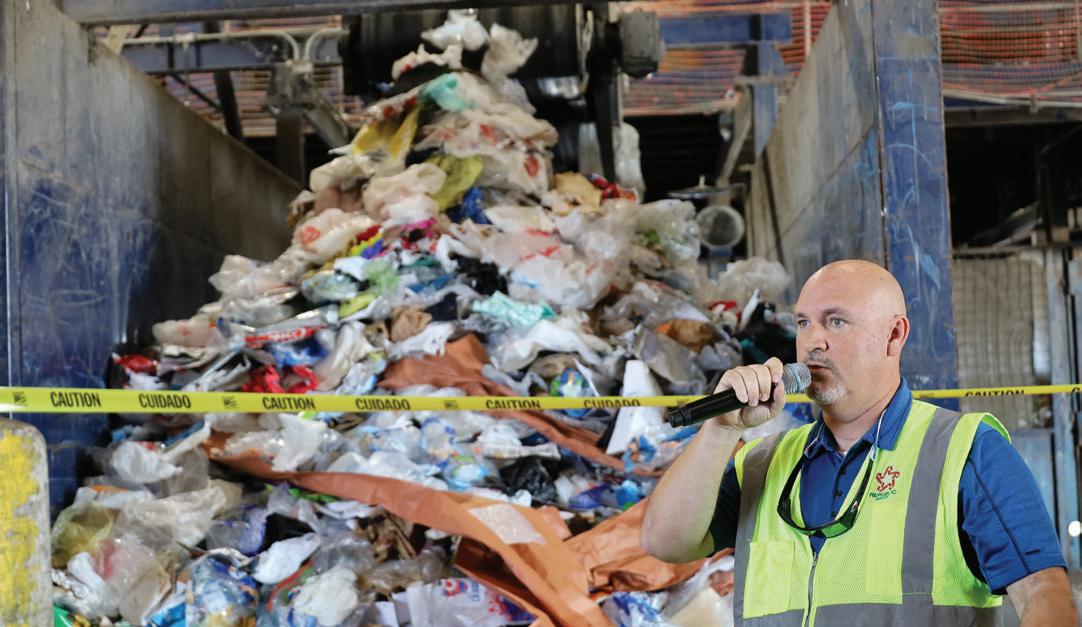
3 minute read
Waste & Recycling
Community education program combats recycling contamination
Recyclable items are ready to be sorted at Republic Services Recycling Facility in Corpus Christi, Texas. (Photo provided)
Everyone wins when residents learn to execute a recycling plan correctly. That’s why the city of Corpus Christi, Texas, is trying to reach people through a new initiative called Recycle Clean, launched early in 2022.
David Lehfeldt, director of solid waste services, explained how any lack of compliance with a community recycling plan comes with a quantifiable cost.
“The problem is that we pay an extra half a million dollars a year to sort out the trash from the recyclable items,” he said. “That’s a very high cost. If we were more careful upfront, we wouldn’t have to pay it. The trash we sort out then still ends up in the landfill. So, we haven’t gained anything there.”
One metric in particular shifted the city’s public education work into high gear.
“When our contamination rate hit about 43%, we knew we had a problem,” he said.
Lehfeldt attributes the noncompliance to a mix of factors: Some residents simply don’t care, while others need more education—although there’s also a “high-performing” group that does a good job with compliance, he said. That leaves a messy middle that needed to be reached.
According to Lehfeldt, outreach to those individuals began last summer. A lot of the work was done with a goal of building trust with the city.
“A lot of people were concerned that we were going to be looking in their recycling bins and were going to issue fines,” he said. “So, we had to work hard to reassure everybody that we weren’t going to be fining everybody, that our goal was not to make a lot of money. In fact, we’d rather not issue fines at all—just purely educate people.”
A community partners program has been launched to work with schools and businesses, including the city’s recycling contractor. “We’re opening the recycling facility up for more tours, too, to help people be more informed and educated about what’s recyclable.”
Two new recycling outreach coordinators have been hired. Lehfeldt said now that COVID-19 numbers are dropping, he hopes they can be more engaged with the community.
It was a slow start to execute the Recycle Clean program on the ground level due to supply chain issues, Lehfeldt said, but it’s now in full swing.
The city has four team members flipping the lids and looking inside the recycling containers. They grade the bins and place one of three different types of tags that communicate the level, or lack thereof, of contamination for educational purposes.
The data helps to frame Corpus Christi’s story. For context and comparison, Lehfeldt cites figures from the Solid Waste Association of North America, which indicates that 25% to 30% of residential recycling bins nationwide are what he refers to as “really serious contamination concerns.”
In the first month and a half of the program, Recycle Clean only had about 7% or 8% of residents receiving a violation tag for repeated serious, almost careless contamination. “It’s a much lower percentage than what we were led to believe we would have, which is heartening.” Mike Reeves, municipal sales manager for Republic Services in the Corpus Christi, Coastal Bend and South Texas region, gives a presentation on recycling for National Recycling Day. (Photo provided)

Corpus Christi Mayor Paulette Guajardo speaks during a tour of the Republic Services Recycling Facility in honor of National Recycling Day, Nov. 15. (Photo provided)

Lehfeldt notes there’s also a percentage of what he calls “wishful recyclers” who have good intentions but need more information so they can comply. He said that cohort represents about 34% of local recyclers.
In his words, “about a third of the people are getting the ‘attaboys,’ which is a good number. But about 60% are getting some kind of tag, which tells us that we’ve got a long way to go when it comes to education.”
“If we can target that 60%, that’s pretty close to compliance, and move them up, that gives us a good chance of getting our contamination rate, way, way, way down,” he said.
The city doesn’t have a lot of data yet to determine the success of the Recycle Clean program. As far as goals, he said they’d like to get contamination down to the 18-20% range in the next few years.
“But we’ve got a long way to go to get there,” Lehfeldt said. “That’s cutting it by more than half. That’s a lot of contamination to remove from the system.”










